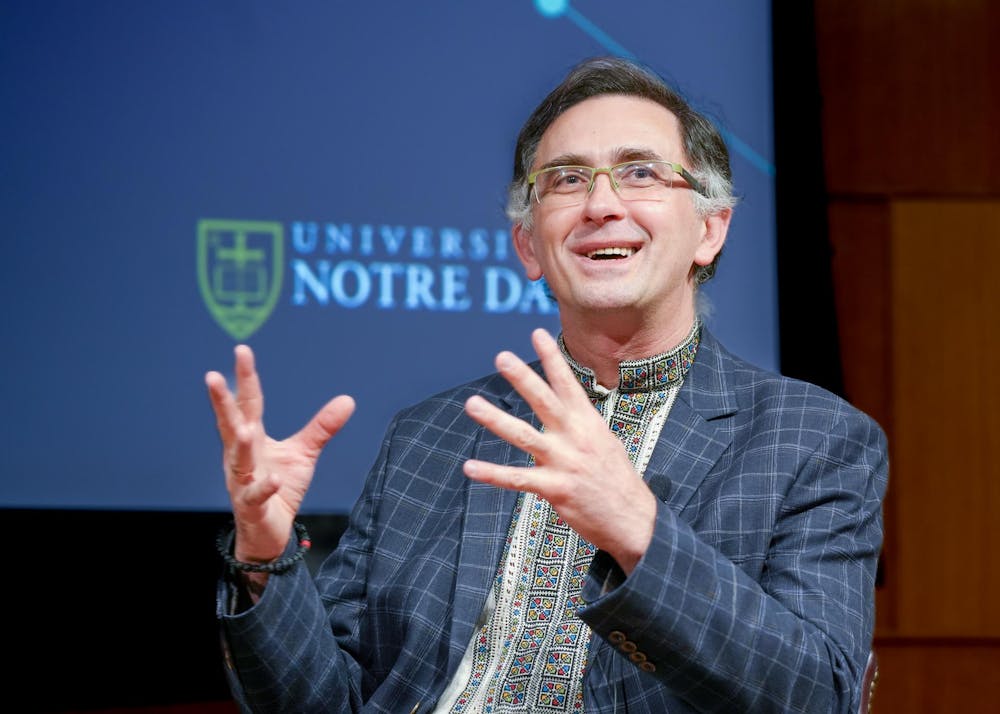On Tuesday afternoon, Volodymyr Turchynovskyy, dean of the social sciences faculty at the Ukrainian Catholic University (UCU) in Lviv, Ukraine, sat down with Nitesh Chawla, founding director of the Lucy Family Institute for Data & Safety, for a fireside chat on Ukrainian resilience and university partnerships in the Hesburgh Center Auditorium.
Turchynovskyy opened with a brief history of UCU, describing the myriad conflicts which the school had endured since its founding as the Lviv Theological Academy in 1929. The academy had been shut down by the German and Soviet occupations of Ukraine, and its faculty and students suffered deportations or imprisonments in the Gulag. The modern university was founded in 2002.
“War doesn’t give you any safe place,” Turchynovskyy said. “This is interesting because I often physically can feel that being here, that something that’s a different thing.”
He described his first encounter with Notre Dame at a meeting with professor of international affairs James McAdams in 2005.
“I think it was probably just two persons here on campus who knew what Ukrainian Catholic University was or is, and that was Jimmy McAdams and myself,” Turchynovskyy said. “And now here we are. We’ve built that partnership to an incredible level.”
Turchynovskyy classified his bi-weekly meetings with Notre Dame faculty, which have included conversations with University leadership including President Fr. Robert Dowd, as not only business-minded but as “a real friendship.”
The two universities strengthened this relationship in the aftermath of the Russian invasion of Ukraine in 2022. New grants for collaborative efforts between the faculties were introduced, and an exchange program was created for UCU students to attend Notre Dame for a semester abroad.
Chawla echoed Turchynovskyy’s insistence on the powerful friendship held by the schools and provided insight on his own trip to Lviv. In a firsthand account of resilience, he described his experience of retreating into a hotel basement after hearing an air raid siren only to observe no reactions from Ukrainians nearby.
“It was funny and ironic at the same time … you learn to be attentive to the kind of an aerial sign that happens,” Chawla said.
Turchynovskyy emphasized that the conflict, which originated with the Russian annexation of Crimea in 2014, had dragged on for so long that some of his children had not yet lived in a time of peace.
“When they look at our students, and they are 20 years old … half of their life is already in that war,” he stressed.
Turchynovskyy talked extensively about the emotional toll on households split by recruitment into the armed forces, appearing to tear up while speaking about the role young people and even he may play in the conflict.
In one story, he explained how families watch to make sure their SMS text messages are going through by a confirmation plus sign, and “if you don’t see that plus, I can imagine what goes on in your mind, and that should mean something terrible.”
Turchynovskyy ended the chat with a hopeful outlook for the future of the nation, tasking the younger generation and himself for rebuilding Ukraine regardless of how long it takes.
“You realize that you have to move forward because you have people that you care about,” Turchynovskyy said. “Who else is going to do it?”
The afternoon concluded with a ten-minute video on the history and culture of UCU and a brief Q&A from the audience.
Lucy Family Institute staffer Allison Linhart, who asked a question about a war crimes documentary which Russian claimed to be deepfaked, said she was motivated to attend because of her interest in the film and Turchynovskyy’s reaction to it.
“Among all the tragedy and the pain and everything he’s talked about, he still held himself with such composure and hope,” Linhart said.










